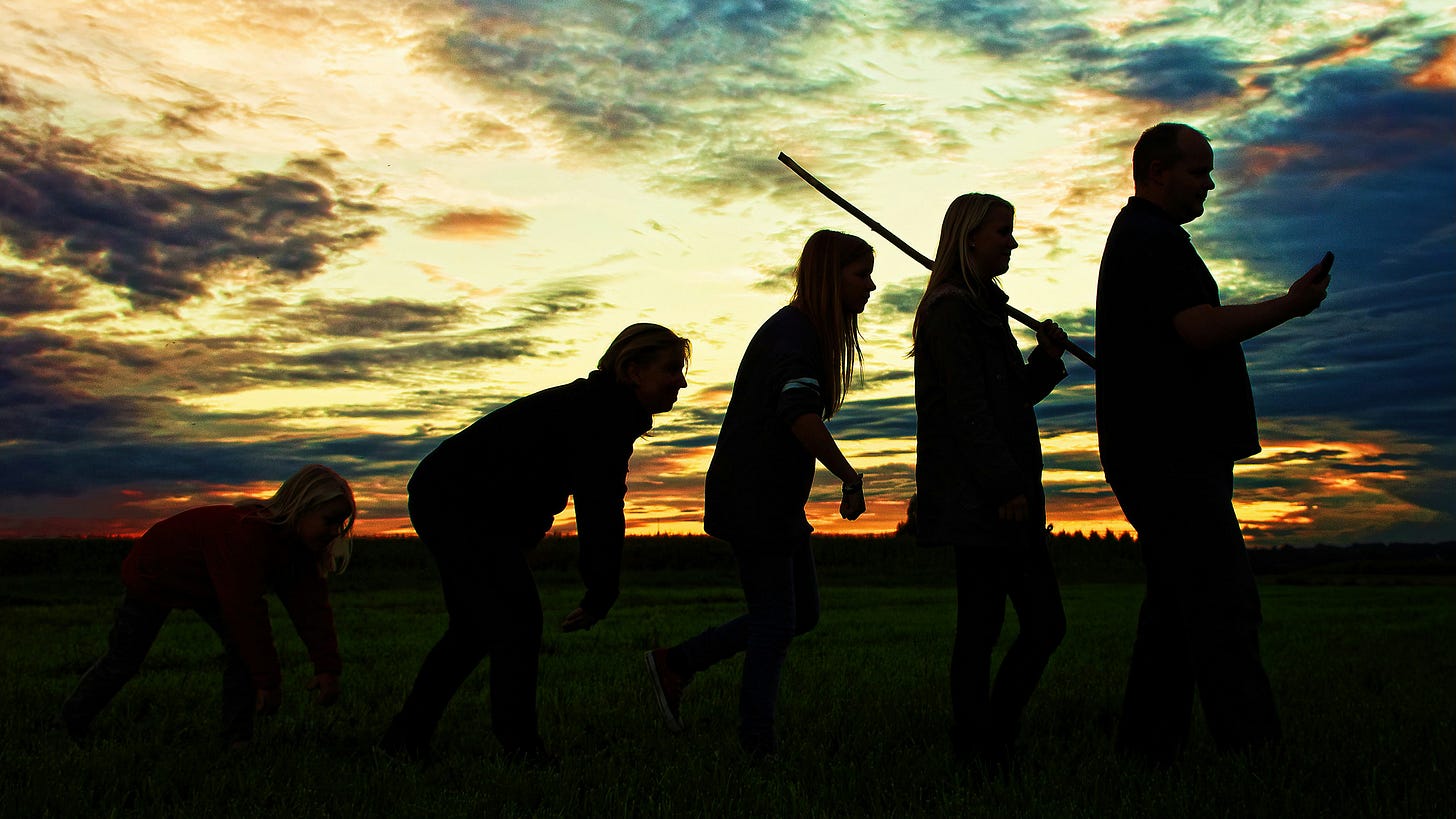
Major Evolutionary Transitions:
Mimetic → Magical → Mythic → Material → Mycelial Consciousness
Major Evolutionary Transitions (METs) refer to significant shifts in the way information is stored, transmitted, and processed in biological and social systems, resulting in new levels of complexity and methods of coordination. These transitions represent fundamental changes in the nature of individuals and groups, often leading to the emergence of new forms of organization and novel ways of interacting with the environment.
The METs we are particularly interested in are listed below.
Mimetic Consciousness
Emerged around 3.5 MYA - The first hominins to be discovered and described from Africa, very basic tool use, used mime to communicate. Characterized by:
Very basic tool use, marking the beginning of technological manipulation of the environment
The use of mime or imitation as a primary form of communication
Rudimentary social learning through observation and replication of behaviors
Magical Consciousness
Emerged around 1 MYA - Homo erectus, Homo heidelbergensis, and the Neanderthals; advanced tool-making and the use of fire; characterized by animism, emotional engagement, and a magical connection to all living beings. Characterized by:
Advanced tool-making abilities, demonstrating increased cognitive complexity and manual dexterity
The mastery and use of fire, a pivotal development in human evolution
A worldview based on animism, attributing consciousness or a soul to natural objects, phenomena, and the Earth itself
Deep emotional engagement with the environment and other beings
A perceived magical or mystical connection to all living entities
Mythic Consciousness
Emerged around 60,000 YA - Homo sapiens, a large and complex brain, the capacity for language and the telling of myths to explain and make sense of the human experience. Characterized by:
The development of a large and complex brain, enabling advanced cognitive abilities
The emergence of sophisticated language skills, allowing for nuanced communication
The capacity to create and share myths, stories, and narratives
The ability to construct abstract explanations for natural phenomena and human experiences
The formation of shared cultural beliefs and values within social groups
Material Consciousness
Emerged around 6,000 YA - This is a period of the rise of Complex Societies. Characterized by cities with monumental architecture, written language, social hierarchy, poverty and wealth, top-down power structures, organized warfare, empires, Patriarchy, the depletion of Nature leading to Overshoot, objectified reality, scarcity, and separation. Characterized by:
An objectified view of reality that separates humans from nature
The development of complex societal structures including cities, written language, and social hierarchies
A tendency towards resource exploitation and environmental depletion
The emergence of organized warfare, empires, and patriarchal power structures
A mindset of scarcity and separation
Mycelial Consciousness
An emerging form of consciousness sometimes referred to as Planetary or Gaia Consciousness, emerging about sixty years ago. This consciousness represents humanity's evolution toward more sophisticated forms of coordination that align with and learn from nature's time-tested patterns of organization. It enables the development of regenerative human systems that can participate consciously in the larger web of life while fostering innovation and resilience. Find out more.
Characterized by:
Systemic Understanding: A superior level of comprehension that recognizes the inherent interconnectedness and interdependence of all systems - social, economic, ecological, and technological - transcending individual, cultural, and national boundaries.
Morphic Resonance Integration: An awareness of and ability to tap into collective memory and patterns intrinsic to nature and human systems, influencing similar forms across time and space, and facilitating rapid learning and adaptation on a global scale.
Network-Centric Paradigm: A shift from viewing the world as a collection of separate entities to perceiving it as an integrated, self-organizing network of networks, where local actions resonate and influence the larger whole.
Collaborative Intelligence: The capacity to contribute to and draw from a collective field of consciousness, enabling more effective problem-solving and innovation through diverse, globally distributed networks.
Adaptive Stewardship: A deep sense of responsibility for the well-being of the planet and all its inhabitants, driven by the understanding that local actions have global implications, leading to more sustainable and equitable ways of living.
Holistic Information Processing: The ability to perceive, interpret, and work with subtle energetic and informational fields that connect all aspects of life, leading to more nuanced decision-making and conflict resolution.
References
AI Podcast Input Material
Direct link to podcast prep: https://notebooklm.google.com/notebook/c2983779-adba-4dd8-a47b-c916bdb65375/audio
https://en.wikipedia.org/wiki/The_Major_Transitions_in_Evolution
The Major Transitions in Evolution by John Maynard Smith and Eörs Szathmáry (1998): https://www.amazon.com/dp/019850294X/
The Major Transitions in Evolution—A Philosophy-of-Science Perspective: https://www.frontiersin.org/articles/10.3389/fevo.2022.793824/full
Major Evolutionary Transitions and the Roles of Facilitation and Information in Ecosystem Transformations: https://www.frontiersin.org/articles/10.3389/fevo.2021.711556/full
The major evolutionary transitions: https://www.nature.com/articles/374227a0 (paywall)
Major evolutionary transitions in individuality: https://www.pnas.org/doi/10.1073/pnas.1421402112
Human Nature Prepares for a Momentous Leap by Clare W. Graves: https://www.clarewgraves.com/articles_content/1974_Futurist/1974_Futurist.html
Recommended Book
Emerging World: The Evolution of Consciousness and the Future of Humanity by Roger Briggs (2021): https://www.amazon.com/dp/B08YNZTZNB/
Deep dive: https://bit.ly/M-E-T and https://bit.ly/Em-World













Share this post